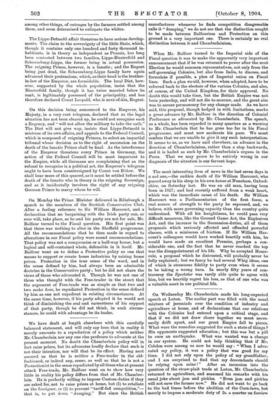When Mr. Balfour turned to the Imperial side of the
Fiscal question it was to make the apparently very important announcement that if he was returned to power after the next Election he would summon representatives, not only from the self-governing Colonies, but also from India, to discuss, and formulate if possible, a plan of Imperial union on Fiscal lines. Such a plan would, however, when adopted, have to be referred back to the electors of the various Colonies, and also, of course, of the United Kingdom, for their approval. No doubt this would take time, but the British Empire was not born yesterday, and will not die to-morrow, and the great aim was to secure permanency for any change made. As we have said, this proposal, though hedged in with limitations, marks a great advance by Mr. Balfour in the direction of Colonial Preference as advocated by Mr. Chamberlain. The speech, as a whole, has been regarded in many quarters as a warning to Mr. Chamberlain that he has gone too far in his Fiscal programme, and must now moderate his pace. We must confess that we are unable to give it any such interpretation. It seems to us, as we have said elsewhere, an advance in the direction of Chamberlainism, rather than a step backwards, and it is hailed as such by Mr. Chamberlain's organs in the Press.. That we may prove to be entirely wrong in our diagnosis of the situation is our fervent hope.










































 Previous page
Previous page